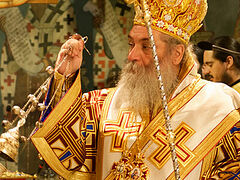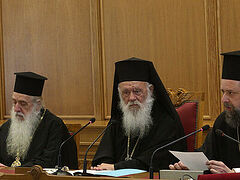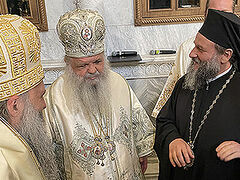Skopje, North Macedonia, July 26, 2022
Understanding the sensitivity of the issue surrounding its name, the Macedonian Orthodox Church-Ohrid Archbishopric won’t force Greek-speaking Churches to call it “Macedonian,” and it hopes for understanding and a spirit of reconciliation from the Greek side as well, says the primate of the newly recognized Church.
In an interview with the Serbian outlet Politika yesterday, His Eminence Archbishop Stefan reflected on the events of recent months that saw the MOC be recognized by the Patriarchate of Constantinople, return to the Serbian Patriarchate as an autonomous Church, and finally, receive full autocephaly from the Bishops’ Council of the Serbian Orthodox Church.
Despite the joy of a previously schismatic Church of millions of people returning to the fold of the Orthodox Church, the issue of the Church’s name often takes center stage. Constantinople recognized the MOC, but only under the title of the “Ohrid Archbishopric.” The SOC referred to the MOC under its full title of “Macedonian Orthodox Church-Ohrid Archbishopric” and called upon its hierarchs to work out the issue of its name in concert with other Local Churches.
The Synod of the Greek Church then resolved to welcome Constantinople’s decision to recognize the MOC, but also expressed “serious objections and reservations” about the Church’s name of “Macedonian.”
Conversely, hierarchs of the Bulgarian Church, while formally entering into communion with the MOC, are concerned about the name of “Ohrid Archbishopric,” as the Bulgarian Church understands itself as the historical continuation of the ancient Ohrid Archbishopric.
Asked by Politika about this sensitive issue, Abp. Stefan spoke with a spirit of compromise:
We are aware of the sensitivity of the question about our name with the Greek block of Churches. Therefore, we won’t ask them to call us by a name they don’t like. Since we’re the heirs of the famous Ohrid Archbishopric, being addressed by that name on their part isn’t a problem for us.
However, I’m convinced that our brother hierarchs and generally the faithful people of the Greek-speaking Orthodox world will understand that we can’t call ourselves anything other than Macedonians, i.e. that for us our Church is as much Macedonian as it is Ohrid.
And focusing on the heart of the Church’s life, the Archbishop expressed hope:
There will probably be things that will have to be resolved, but faith and love can move mountains. If both parties show that they act in the love of Christ, an agreement will be easily reached between the Greek churches and ours, the Macedonian Church.
The MOC primate also emphasized the role of dialogue and collegiality in the Church, which helped them to see that “the mutual distrust of past decades had disappeared.” Quoting His Holiness Patriarch Porfirije of the Serbian Church, the Archbishop emphasized: “We concluded that Christ is our first priority, so everything fell into place.”
According to Abp. Stefan, earlier attempts to start a dialogue with the SOC bore little fruit, but after Patriarch Bartholomew of Constantinople accepted to consider the MOC’s request, and with the election of Pat. Porfirije as primate of the Serbian Church, “a new page has been opened in the relations between our Churches, for which we are immensely grateful both as a people and as a Church.”
Asked what it means for the MOC that the Serbian Church has recognized its autocephaly, His Eminence Archbishop Stefan of Skopje expressed confidence that it was a great event not only for the MOC, but for the entire Church.
“For our hierarchy and faithful, the impossibility of Eucharistic communion with our Orthodox brothers and sisters from other Local Orthodox Churches was an open wound that has now healed. In addition, we now have the opportunity to expand our multifaceted cooperation with other Local Churches. All this will bear great fruit,” the MOC primate said.
“Every meeting ennobles and enriches, especially joint liturgical thanksgiving, joint prayers, and mutual conversations with fellow believers from other Local Churches,” the Archbishop stressed.
Pilgrims who were previously discouraged from traveling to Macedonia will now feel free to visit the ancient churches and monasteries there, he added.
The Archbishop also spoke about how pleased he was, decades after a Serbian Patriarch, German, last visited in 1962, to host Pat. Porfirije in Ohrid, “the pan-Slavic Jerusalem, this ancient city located next to the pearl of Lake Ohrid, filled with churches where God has been hymned and glorified for more than 1,000 years.”
Asked to offer a word to the Serbian faithful, the Archbishop encouraged them “to know, to keep, and to live according to the faith … that was passed on to us and is being passed on by our fathers.” He also stressed that all Orthodox faithful should take up the whole armor of God to defend themselves against the devil’s cunning, and make their lives a “continuous praise to God.”
Follow OrthoChristian on Twitter, Vkontakte, Telegram, WhatsApp, MeWe, and Gab!




